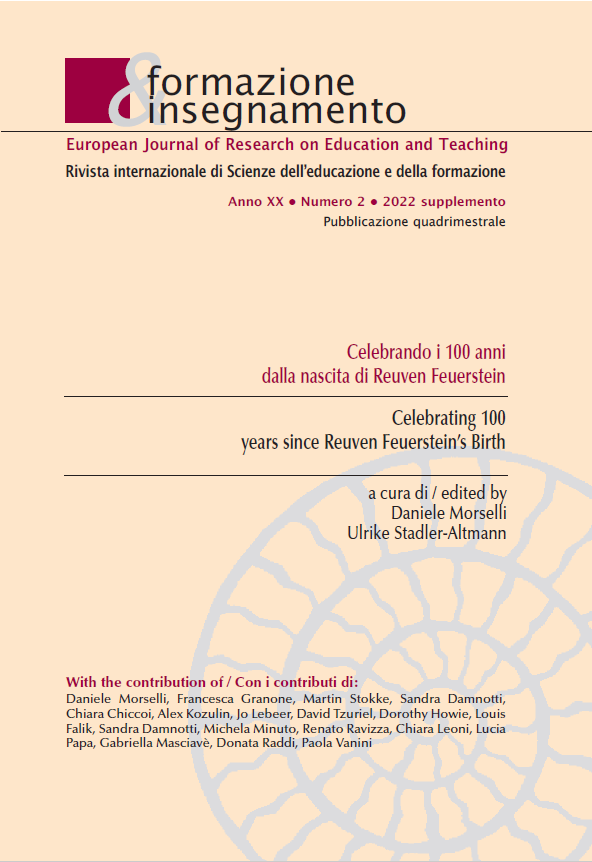Vygotsky’s and Feuerstein’s Theories for the 21st century
DOI:
https://doi.org/10.7346/-feis-XX-02-22_02Keywords:
Vygotsky, Feuerstein, Cultural difference, Dynamic assessment, EducationAbstract
There is a certain mystery in the current popularity of Vygotsky’s and Feuerstein’s ideas. On the surface, this growing interest is paradoxical – the ideas that emerged in Russia in the 1920s and in Israel of the 1960s are supposed to be light years behind the concerns of Western psychologists and educators of the 21st century. What then makes Vygotsky’s and Feuerstein’s ideas so contemporary? The article suggests that the current popularity of these ideas is related to the almost perfect match between “answers” given by Vygotsky and Feuerstein to the “questions” that, often without any direct impact of their theories, had emerged in Western psychology and education at the end of the 20th century. The discussion is focused around three key issues: Cultural difference, dynamic assessment, and the relationships between cognition and education.
References
Budoff, M., & Friedman, M. (1964). “Learning potential” as an assessment
approach to the adolescent mentally retarded. Journal of Consulting Psychology,
(5), 434–439.
Davydov,V.V. & Mochay,P. (2008).Developmental instruction: A theoretical and experimental psychological study. Nova Science Publishers.
Feuerstein, R. (1991). Cultural difference and cultural deprivation. Differential patterns of adaptability. In N.Bleichrodt and P.Drenth (Eds.), Contemporary Issues in Cross-Cultural Psychology (pp.21-33). Swets & Zeitlinger.
Feuerstein, R. & Rand, Y. (1974). Mediated Learning Experience: An outline of proximal etiology for differential development of cognitive functions. Journal of International Council of Psychology, 9-10, 7-37.
Feuerstein, R., Rand, Y., & M. Hoffman (1979). Dynamic assessment of the retarded performer. University Park Press.
Feuerstein, R., Rand, Y., & Hoffman, M., & Miller, R. (1980). Instrumental Enrichment: An intervention program for cognitive modifiability. University Park Press.
Hadas-Lidor, N., Weiss, P., & Kozulin, A. (2018). Dynamic cognitive intervention:
Application in occupational therapy. In N. Katz, (Ed.), Cognition, occupation, and participation across the life span. American Occupational Therapy Association Press.
Haywood, C. & Lidz, C. (2007). Dynamic assessment in practice. Cambridge University Press.
Schmittau, J. (1993). Vygotskian scientific concepts: Implications for mathematics
education. Focus on Learning Problems in Mathematics,15 (2-3), 29-39.
Tzuriel, D. (2021). Mediated learning and cognitive modifiability. Springer.
Vosniadou, S. (Ed.) (2008). International textbook of research on conceptual change. Routledge.
Vygotsky, L. (1934/2012). Thought and language. MIT Press.
Vygotsky, L. (1935/2011). The dynamics of the schoolchild’s mental development in
relation to teaching and learning. Journal of Cognitive Education and Psychology, 10, 198–211.
Vygotsky, L., & Luria, A.R. (1930/1993). Studies on the history of behavior: Ape, primitive, and child. Lawrence Erlbaum Associates.
Downloads
Published
How to Cite
Issue
Section
License
Copyright (c) 2022 Alex Kozulin

This work is licensed under a Creative Commons Attribution 4.0 International License.
Formazione & insegnamento is distributed under Attribution 4.0 International (CC BY 4.0).
For further details, please refer to our Repository & Archiving Policy, as well as our Copyright & Licensing Terms.





